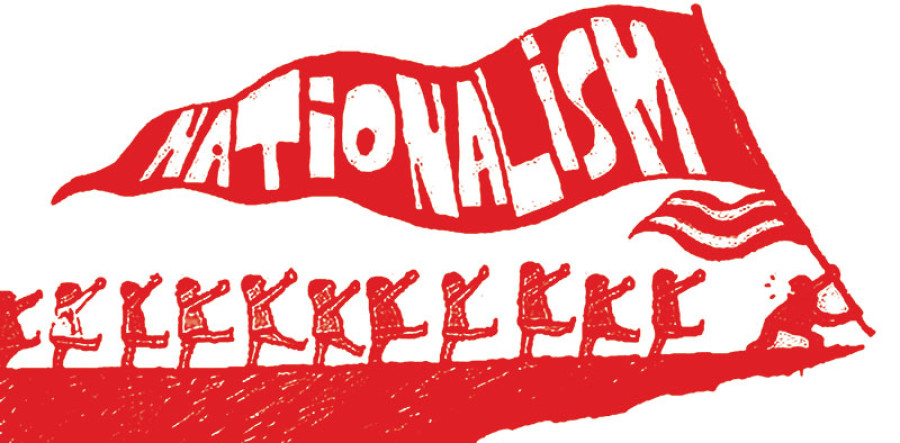Opinion
Nationalism: An alternative view
Nationalism should build confidence of citizens in their political leaders
Naresh Koirala
Economic development (Arthik Samariddhi) and nationalism (Rastriyata) are two of the Oli government’s foremost priorities. The government’s policies and program and the budget presented to the parliament help to understand the economic development part. Time will tell whether the development targets are realistic or public relation hyperboles.
Understanding the nationalism part is a challenge. Nationalism is perhaps one of the least understood and over used (more correctly, abused) word in political lexicon.
Different context, different understanding
The Oxford English dictionary defines nationalism as “Identification with one’s own nation and support for its interests, especially to the exclusion or detriment of the interests of other nations.” It can take many forms—ethnic nationalism, religious nationalism and so on. Whatever the form, nationality informs a community’s sense of identity and therefore its dignity. This makes the word very emotive and personal.
Yuval Noah Harari, a celebrated historian and author of Sapiens: A Brief History of Humankind characterizes a nation (and therefore nationalism) as an “imagined reality”- an idea created to manage a collective human community, which, over the time, the community comes to believe as an absolute truth. It is different from objective reality like a tree or a river. Like all imagined realities, nationalism’s meaning and application changes with time.
Hitler and Mussolini invoked nationalism to win support for their perverted ideology.
Recep Tayyip Erdogan of Turkey and Nicolas Maduro of Venezuela’s recent power grab strategy were to raise the scepter of foreign intrusion in “our nationalism.” Populists in Poland, Hungary and Italy shrouded their anti-Muslim and anti-European agenda under nationalistic rhetoric to win their elections. Narendra Modi is waving Hindu nationalism to undermine India’s Islamic history and promote Hindu identity while Donald Trump has disguised his white supremacist agenda wrapped around the shrill of “Make America Great Again” nationalism. The abuse of nationalism in these countries has resulted in a deeply divided citizenry and a frightening social discord.
Not so different
Closer to home, while they were making secret deals with India, the Shah Kings and the Rana Prime Ministers used nationalistic public posture to prop up their regime. King Mahendra weaponised “nationalism” to buttress his Panchyat dictatorship and muzzle opposition. He called his opponents anti-nationals (Arastriya Tatwa).
The Maoists based their armed insurgency partly on anti-Indian nationalism, while tacitly working in collusion with the Indians.
Most recently Prime Minister Oli, allegedly pro-India until a few years ago, deftly couched his and the UML’s opposition to Indian blockade and Madeshi movement under nationalistic banner and used it as a winning strategy in the last elections. These are just of few examples of a long list of the abuse of “nationalism” by our leaders. The list could go on.
The abuse of “nationalism” by politicians all over the world has invoked sharp rebuke from observers of history and scholars of international repute. In Man Booker Prize winning novelist Arundhati Roy’s biting words, “Nationalism of one kind or another was the cause of most of the genocide of the twentieth century. Flags are bits of colored cloth that governments use first to shrink-wrap people’s brains and then as ceremonial shrouds to bury the dead”.
George Orwell, the author of highly acclaimed 1984 and Animal Farm said: “Nationalism is power hunger tempered by self-deception.” To Albert Einstein “Nationalism is an infantile disease. It is the measles of mankind.”
Winston Churchill had equally harsh words for any one who invoked nationalism to manipulate gullible public: “Nationalism is the last refuge of scoundrels.”
The drumbeat of nationalism makes little sense in a globalized world. It is stating the obvious. Every political leader has a duty to protect the interest of a nation in all of his/her decisions—be that international or domestic.
International relations are governed by international laws and agreements between nations. Nepal Army Colonel Kumar Lama was arrested and tried in the UK under the UN convention against torture for the alleged human rights abuses he committed in Nepal. Nepal government’s outcry of “affront to our internal affairs (i.e. to nationalism)” did not do much to change Lama’s fate. Lama’s nationality meant little.
Invoking nationalism to malign opposition or to make political points at home is pure demagoguery. It is divisive and dangerous.
Mr. Oli has not told us what he means when he talks about Rastriyata. I suggest the nation would be served better if nationalism is defined in terms of the confidence of citizens in their political leaders and public institutions. The government’s focus has to be on strengthening that confidence and making people feel that their government cares. A despondent citizenry is the anti-thesis of nationalism.
When the government willfully undermines the Supreme Court of the country by machinating a pardon to a partisan convicted criminal; when, despite huge public opposition, the government buys support from parliamentarians by dishing out millions of rupees to spend for their pet projects; when political leaders who have never worked for a living are amongst the wealthiest in the country and openly use their legislative perch to promote their commercial interest and the government does nothing to stop it, all talks of “nationalism” become a hoax.
Koirala is a geotechnical consultant resident in Vancouver, Canada




 9.7°C Kathmandu
9.7°C Kathmandu










